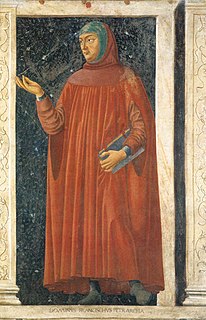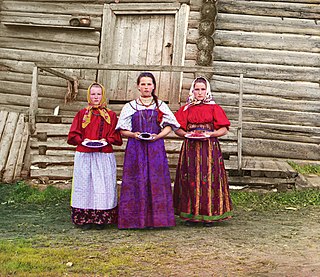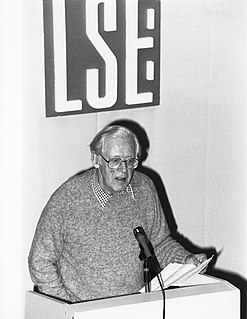
Chinese historiography is the study of the techniques and sources used by historians to develop the recorded history of China.

Periodization is the process or study of categorizing the past into discrete, quantified named blocks of time. This is usually done in order to facilitate the study and analysis of history, understanding current and historical processes, and causality that might have linked those events.

A society is a group of individuals involved in persistent social interaction, or a large social group sharing the same geographical or social territory, typically subject to the same political authority and dominant cultural expectations. Societies are characterized by patterns of relationships between individuals who share a distinctive culture and institutions; a given society may be described as the sum total of such relationships among its constituent of members. In the social sciences, a larger society often exhibits stratification or dominance patterns in subgroups.

Magic is a category in Western culture into which have been placed various beliefs and practices considered separate from both religion and science. Historically, the term often had pejorative connotations, with things labelled magical perceived as being primitive, foreign, and Other. The concept has been adopted by scholars in the study of religion and the social sciences, who have proposed various different—and often mutually exclusive—definitions of the term; much contemporary scholarship regards the concept to be so problematic that it is better to reject it altogether as a useful analytic construct.

A peasant is a pre-industrial agricultural laborer or farmer, especially one living in the Middle Ages under feudalism and paying rent, tax, fees, or services to a landlord. In Europe, peasants were divided into three classes according to their personal status: slave, serf, and free tenant. Peasants either hold title to land in fee simple, or hold land by any of several forms of land tenure, among them socage, quit-rent, leasehold, and copyhold.

A fief was the central element of feudalism and consisted of heritable property or rights granted by an overlord to a vassal who held it in fealty in return for a form of feudal allegiance and service, usually given by the personal ceremonies of homage and fealty. The fees were often lands or revenue-producing real property held in feudal land tenure: these are typically known as fiefs or fiefdoms. However, not only land but anything of value could be held in fee, including governmental office, rights of exploitation such as hunting or fishing, monopolies in trade, and tax farms.

A vassal is a person regarded as having a mutual obligation to a lord or monarch, in the context of the feudal system in medieval Europe. The obligations often included military support by knights in exchange for certain privileges, usually including land held as a tenant or fief. The term is applied to similar arrangements in other feudal societies.
Neo-feudalism or new feudalism refers to a theorized contemporary rebirth of policies of governance, economy, and public life reminiscent of those present in many feudal societies, such as unequal rights and legal protections for common people and for nobility.
Examples of feudalism are helpful to fully understand feudalism and feudal society. Feudalism was practiced in many different ways, depending on location and time period, thus a high-level encompassing conceptual definition does not always provide a reader with the intimate understanding that detailed historical examples provide.

Rodney Howard Hilton, FBA was an English Marxist historian of the late medieval period and the transition from feudalism to capitalism. He was born in Manchester and studied at Balliol College Oxford University and was a member of the Communist Party Historians Group before leaving the party in 1956 with many others. He had a 36-year teaching career at the University of Birmingham. His papers are held at the University of Birmingham Special Collections.

Indian feudalism refers to the feudal society that made up India's social structure until independence in 1947.
Refeudalization is the process of recovering mechanisms and relationships that used to define feudalism. Because the term "feudalism" is slightly ambiguous, "refeudalization" is ambiguous, too.

The theory of the Asiatic mode of production (AMP) was devised by Karl Marx around the early 1850s. The essence of the theory has been described as "[the] suggestion ... that Asiatic societies were held in thrall by a despotic ruling clique, residing in central cities and directly expropriating surplus from largely autarkic and generally undifferentiated village communities".
Fēngjiàn (封建) was a political ideology during the later part of the Zhou dynasty of ancient China, its social structure forming a decentralized system of government based on four occupations, or "four categories of the people." The Zhou kings enfeoffed their fellow warriors and relatives, creating large domains of land. The Fengjian system they created allocated a region or piece of land to an individual, establishing him as the ruler of that region. These eventually rebelled against the Zhou Kings, and developed into their own kingdoms, thus ending the centralized rule of the Zhou dynasty. As a result, Chinese history from the Zhou or Chou dynasty to the Qin dynasty has been termed a feudal period by many Chinese historians, due to the custom of enfeoffment of land similar to that in Europe. But scholarship has suggested that fengjian otherwise lacks some of the fundamental aspects of feudalism. It often related with Confucianism but also Legalism.

In sociology, the East–West dichotomy is the perceived difference between the Eastern and Western worlds. Cultural rather than geographical in division, the boundaries of East and West are not fixed, but vary according to the criteria adopted by individuals using the term. Historically, Asia was regarded as the East, and Europe was regarded as the West. Today, the "West" usually refers to Australasia, Europe, and America. Used in discussing such studies as management, economics, international relations, and linguistics, the concept is criticized for overlooking regional hybridity.

Feudalism as practiced in the Kingdom of England was a state of human society which was formally structured and stratified on the basis of land tenure and the varieties thereof. Society was thus ordered around relationships derived from the holding of land, which landholdings are termed "fiefdoms, traders, fiefs, or fees".

Marxist historiography, or historical materialist historiography, is a school of historiography influenced by Marxism. The chief tenets of Marxist historiography are the centrality of social class and economic constraints in determining historical outcomes.

Bourgeois revolution is a term used in Marxist theory to refer to a social revolution that aims to destroy a feudal system or its vestiges, establish the rule of the bourgeoisie, and create a bourgeois state. In colonised or subjugated countries, bourgeois revolutions often take the form of a war of national independence. The English, French, and American revolutions are considered the archetypal bourgeois revolutions, in that they attempted to clear away the remnants of the medieval feudal system, so as to pave the way for the rise of capitalism. The term is usually used in contrast to "proletarian revolution", and is also sometimes called a "bourgeois-democratic revolution".



















